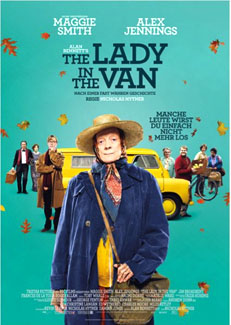 1/2
1/2
UK 2015
Opening April 14, 2016
Directed by: Nicholas Hytner
Writing credits: Alan Bennett
Principle actors: Maggie Smith, Alex Jennings, Jim Broadbent, Deborah Findlay, Roger Allam Camden Town, London, 1970. Playwright Alan Bennett’s (Jennings) new neighbors quickly enlighten him about the decrepit van and woman living in their street. A transient eccentric, some look out for her; Alan’s good intentions develop into a strained relationship with Miss Mary Shepherd (Smith). Living alone, Alan talks to himself, i.e. his alter ego—“you live life and I write about it.” Who shrewdly susses out the situation, warning Alan. Still, the pigheaded Miss Shepherd’s finagled consent to temporarily park in his drive is prolonged. Years pass: Alan’s mum (Gwen Taylor) is miffed by Mary’s presence; Mrs. Vaughan Williams (Frances de la Tour) garners personal details from her, just as two social workers (Claire Foy, Cecilia Noble) have varying degrees of success trying to help; a late night caller (Broadbent) informs Allan Mary is really Margaret. Alternatively, Mary faithfully adheres to her self-defined schedule, paints her van, and buys a three-wheeler. Collecting pieces of “his old lady’s” past, only after her 1989 death does the two Alan’s discover the depth of Margaret’s richly diverse, gifted and at times successful life.
Camden Town, London, 1970. Playwright Alan Bennett’s (Jennings) new neighbors quickly enlighten him about the decrepit van and woman living in their street. A transient eccentric, some look out for her; Alan’s good intentions develop into a strained relationship with Miss Mary Shepherd (Smith). Living alone, Alan talks to himself, i.e. his alter ego—“you live life and I write about it.” Who shrewdly susses out the situation, warning Alan. Still, the pigheaded Miss Shepherd’s finagled consent to temporarily park in his drive is prolonged. Years pass: Alan’s mum (Gwen Taylor) is miffed by Mary’s presence; Mrs. Vaughan Williams (Frances de la Tour) garners personal details from her, just as two social workers (Claire Foy, Cecilia Noble) have varying degrees of success trying to help; a late night caller (Broadbent) informs Allan Mary is really Margaret. Alternatively, Mary faithfully adheres to her self-defined schedule, paints her van, and buys a three-wheeler. Collecting pieces of “his old lady’s” past, only after her 1989 death does the two Alan’s discover the depth of Margaret’s richly diverse, gifted and at times successful life.
Filmed at the site where Bennett and Miss Shepherd lived, director Nicholas Hytner passed the home in the 1980s on his way to work. Subsequent to reading a memoir by Bennett in 1989, he knew the full story. Bennett and Hytner collaborated on The Madness Of King George 1994, The History Boys 2006, and on Bennett’s 1999 theatre play, starring Maggie Smith. In the screenplay, Bennett includes in Miss Shepherd’s personality a feeling of regret for how her life could have been. Allan Bennett and Hytner worked nine months on the screenplay.
Both were keen to work with British producers Damian Jones and Kevin Loader again (The History Boys). Maggie Smith is phenomenal, Alex Jennings extraordinary, the casts’ performances subtly captivating. Tariq Anwar fluently edits the chronologically fluid timeline. Andrew Dunn’s cinematography, together with George Fenton’s music, elevates the 1960s to 1980s ambience. Only at the end do we realize a key piece of Margaret Fairchild’s puzzle was shown early in the film. This quiet film is rich in messages – knowledge gained through a long life’s experiences – that linger after the visual pleasure. Afterward, you may catch yourself chuckling, when thinking about just who got the last laugh.103 minutes ()
